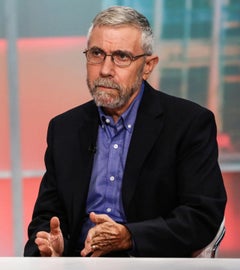MI SELECCIÓN DE NOTICIAS
Noticias personalizadas, de acuerdo a sus temas de interés

Have things improved since then? In some ways, they have gotten even worse: These days, media balance often seems to involve retroactively rewriting history to avoid telling readers that supporters on one side of a policy debate got things completely wrong.
In particular, when you see reports on monetary disputes, you often see characterizations of what the Federal Reserve’s right-wing critics have been saying that go something like this, from a recent Washington Post article: “Among the criticisms: The Fed was keeping interest rates artificially low and fueling speculative bubbles. The helicopter-drop of money known as quantitative easing did little more than inflate stock markets and fund Washington’s deficit spending. The bailout of big banks left them bigger than ever.”
Um, no.
The conservatives who gathered at the Jackson Hole Summit earlier this month weren’t warning about bubbles and too-big-to-fail banks. They were warning, in apocalyptic terms, that runaway inflation was just around the corner.
Why would a reporter credit the Fed’s critics with warnings they didn’t give, and fail to mention what they actually said? The answer is that if you wrote, for instance, that “Ron Paul has been predicting runaway inflation ever since the Fed began its expansionary policies,” you would make it clear that the former Republican congressman and presidential candidate has been utterly wrong the whole time. And conveying that truth - even as a matter of simple factual reporting - is apparently considered taking a side.
So what we get instead is a whitewashing of the intellectual history, in which Fed critics are portrayed as making arguments that haven’t been shown to be ridiculous. It’s a pretty sorry spectacle.
The reactionary soul
In a recent Times column, Frank Bruni marveled at polls that indicate that Donald Trump, with his multiple marriages and casinos, is the preferred presidential candidate among Republican evangelical Christians. Other commentators are shocked to see a crude mercantilist make so much headway in the alleged party of free markets. What happened to conservative principles?
Actually, nothing - those alleged principles were never real. Conservative religiosity and faith in the markets were never about living a godly life or letting the invisible hand promote entrepreneurship. Instead, as City University of New York political science professor Corey Robin describes it, modern conservatism is “a reactionary movement, a defense of power and privilege against democratic challenges from below, particularly in the private spheres of the family and the workplace.”
It’s really about who’s boss, and making sure that the man in charge stays boss. Mr. Trump is admired for putting women and workers in their place, and it doesn’t matter if he covets his neighbor’s wife or demands trade wars.
The point is that Mr. Trump isn’t a diversion - he’s a revelation, bringing the real motivations of the conservative movement out into the open.
Le quedan pocos meses a la administración actual y bien haría el presidente en asumir el liderazgo del gobierno y no permitir esas peleas entre funcionarios que acaban de empeorar
El ciudadano común nunca las relaciona con el salario mínimo, pero vive sus consecuencias. Por ejemplo, puede complicar lograr la pensión para algunos Colombianos